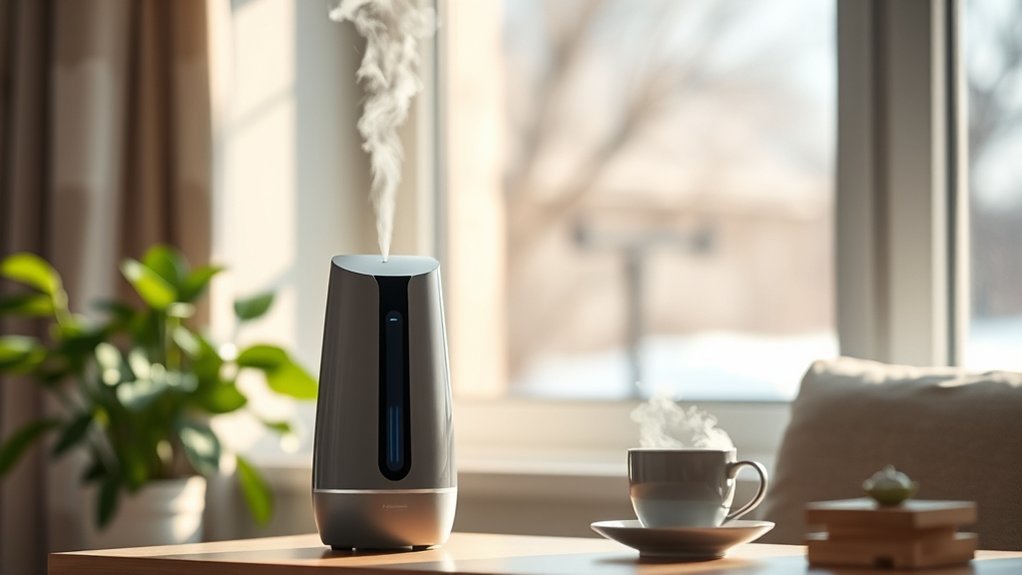You’ve probably heard a lot about humidifiers, but how much of it is actually true? Many believe they’re only necessary in winter, but that’s just one of several misconceptions. Understanding the benefits and potential risks can help you make better choices for your indoor air quality. Plus, with various types available, picking the right one can be confusing. Let’s explore what you really need to know about humidifiers and their role in your home.
Common Misconceptions About Humidifiers
While you might think that humidifiers are just for winter months, that’s only one of many misconceptions surrounding these devices.
Many believe that using a humidifier isn’t necessary in warmer seasons, but ideal humidity levels are essential year-round to maintain comfort and health. In fact, humidifier efficiency can greatly impact your indoor environment, especially during dry summer air conditioning.
Some people also think that all humidifiers are the same, but they vary widely in design and effectiveness. Understanding the right type for your space can enhance moisture distribution and improve air quality.
Benefits of Using Humidifiers
Humidifiers offer a range of benefits that can greatly enhance your indoor environment. By maintaining ideal moisture levels, they help combat dry air, which can lead to discomfort and health issues.
Improved humidity can alleviate symptoms associated with allergies, asthma, and colds, supporting your respiratory health. When your air isn’t too dry, you’re less likely to experience irritation in your throat and nasal passages.
Additionally, humidifiers can protect your home and belongings by preventing damage from excessive dryness. Imagine waking up refreshed, with clearer air and more comfortable skin.
Embracing a humidifier not only transforms your living space but also promotes overall well-being, allowing you to thrive in a healthier, more inviting atmosphere.
Potential Risks and Safety Concerns
Although humidifiers can considerably improve your indoor air quality, they also come with potential risks that shouldn’t be overlooked. One major concern is the water quality you use; if it’s contaminated, you could be introducing allergens and bacteria into your home. This can lead to allergic reactions and respiratory issues, especially for those with sensitivities.
Additionally, over-humidifying your space can create a breeding ground for mold and dust mites, exacerbating these problems. To stay safe, it’s essential to regularly clean your humidifier and use distilled water when possible.
Choosing the Right Humidifier for Your Needs
How do you choose the right humidifier to meet your specific needs?
Start by considering the climate in your home. If you live in a dry area, a cool mist humidifier can help add moisture without raising the temperature, making it ideal for summer use.
On the other hand, a warm mist humidifier is perfect for colder climates, providing soothing warmth that can alleviate congestion and enhance comfort during winter months.
Think about the size of the space you want to humidify, as well. Portable models work well for single rooms, while larger units can handle whole-house needs.
Ultimately, your choice should balance comfort and practicality, ensuring you breathe easier and enjoy a healthier environment.
Maintenance and Care for Humidifiers
When it comes to keeping your humidifier running smoothly, regular maintenance is vital for peak performance and hygiene.
Start by checking the filter regularly; filter replacement is essential to prevent mold and bacteria buildup. Depending on usage, you might need to replace it every one to three months.
Also, pay attention to your water quality. Using distilled or demineralized water can greatly reduce mineral deposits that can harm your humidifier and affect air quality.
Don’t forget to clean the tank and other parts weekly with a mixture of water and vinegar to guarantee freshness.
Frequently Asked Questions
Can Humidifiers Help With Allergies or Asthma Symptoms?
Yes, humidifiers can offer allergy relief and assist with asthma management. They maintain ideal humidity levels, reducing irritation in your airways and helping you breathe easier. Just make sure you keep them clean to avoid allergens.
How Often Should I Replace the Water in My Humidifier?
You should replace the water in your humidifier daily for ideal hygiene practices. Regular water maintenance prevents mold and bacteria growth, ensuring a healthier environment and maximizing the benefits of your humidifier for your well-being.
Can I Use Essential Oils in My Humidifier?
You can’t use essential oils in your humidifier; it can damage the unit and affect air quality. Think of it like adding spices to a delicate sauce. Prioritize essential oil safety and regular humidifier maintenance instead.
Do Humidifiers Consume a Lot of Electricity?
Humidifiers don’t consume a lot of electricity, especially modern, energy-efficient models. Their electricity usage is typically low, making them a practical choice for improving your indoor air quality without greatly impacting your energy bills.
How Do I Know if My Humidifier Is Working Effectively?
To check if your humidifier’s working effectively, monitor humidity levels with a hygrometer. Aim for 30-50% humidity. Regularly clean your unit and replace filters; these maintenance tips guarantee peak performance and a comfortable environment.
Conclusion
To summarize, humidifiers play an essential role in maintaining ideal air quality year-round, not just during winter. Research shows that maintaining humidity levels between 30% and 50% can reduce the spread of airborne viruses by over 30%. By understanding the myths and facts surrounding these devices, you can make informed choices that enhance your comfort and health. Remember to choose the right humidifier and keep it well-maintained for the best results in your living space.
